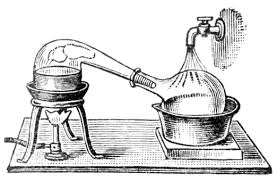中文词源
retort 回应,反驳
re-,相对,相反,-tort,弯,转,词源同 torture,turn.引申词义回应,反驳。
英语词源
- retort
-
retort: see torment
- retort (v.)
- 1550s, "make return in kind" (especially of an injury), from Old French retort and directly from Latin retortus, past participle of retorquere "turn back, twist back, throw back," from re- "back" (see re-) + torquere "to twist" (see torque (n.)). Applied to exchanges of jest or sarcasm by c. 1600, hence "say or utter sharply and aggressively in reply" (1620s). Related: Retorted; retorting.
- retort (n.1)
- "act of retorting," c. 1600, from retort (v.).
- retort (n.2)
- "vessel used in chemistry for distilling or effecting decomposition by the aid of heat," c. 1600, from Middle French retorte, from Medieval Latin *retorta "a retort, a vessel with a bent neck," literally "a thing bent or twisted," from past participle stem of Latin retorquere (see retort (v.)).
权威例句
- 1. His sharp retort clearly made an impact.
- 他尖刻的反驳显然起了作用。
- 2. Her retort was mechanical.
- 她的反驳是脱口而出的。
- 3. He scored a bull's - eye in their argument with that witty retort.
- 在他们的辩论中他那一句机智的反驳击中了要害.
- 4. He opened his mouth to make a caustic retort.
- 他张嘴开始进行刻薄的反击.
- 5. I said a few words to him in retort.
- 我顶了他几句.
